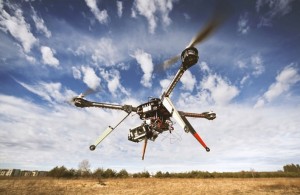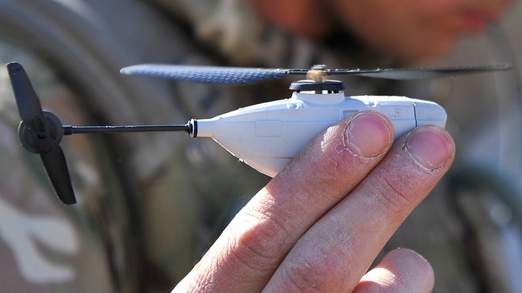The Humanevangelist: Hello Drones; So Long Safety or Privacy

Years ago on a hot summer’s afternoon in Virginia, my brother and I entered a Civil War-era graveyard to do a little amateur historical research. Little did we know that armed sentinels guarded the tombs. I hit the first one I saw and heard my brother do the same. Then, hordes of them rushed at us in a fury. We fled as fast as our feet would carry us.
They were just mosquitoes, of course. But imagine one day soon being surrounded by a squadron of tiny drones. They might only be spying on you, but they could just as easily have deadly intent. A small cargo of plastic explosive, neurotoxin, or radioactive polonium in each drone would be enough to ensure an untraceable murder.

Photo by United Kingdom Ministry of Defense
If this sounds like Buck Rogers on a bad trip, consider this: in July the U.S. Army unveiled a minnow-size drone that could do the job. The FAA just opened the doors to commercial use of drones. In Europe last week, DHL announced a quadcopter delivery service. Amazon is in hot pursuit. And right now anyone can buy a quadcopter off the shelf and modify it to their heart’s content.
There’s no turning back, nor should there be. All the same, we need to have an honest conversation now. First, we must acknowledge that soon anyone will have the means to commit anonymous murder. Second, we must acknowledge that there is a strong likelihood that some people would seize the opportunity. Third, we must face the unhappy fact that the only way to counter such bloody chaos is through an effective surveillance state.
If you’ve read my writings, you’ll know I am no dystopian. As a humanist, I embrace the role technology has played in freeing 98 percent of us from the drudgery and dangers of agricultural labor and allowing us to pool our collective smarts to make life much better for all. However, as with humankind’s first technology, we are playing with fire.
For millions of years our ancestors relied on fire for warmth, light, cooking, and protection from predators. But they knew all too well that fire is your friend only while under control. As civilization advanced, the dangers from fire grew with it. Rome, London, and Chicago are among the many cities that have been leveled by fire. With the rise of drones, we face a new inferno.
That anonymous killing can be committed by drone is self-evident. The CIA already does it; non-state actors will soon be able to as well. Would others do it? Terrorists will certainly leap at the chance to cause mayhem and sow panic. Lunatics and malcontents will also join the fray. But how many others?
The sad truth about ourselves is that nearly all of us have homicidal fantasies. Evolutionary psychologist David Buss, who led what may be the largest study ever of such things, found that 91 percent of men and 84 percent of women have had at least one detailed fantasy of committing murder. “Killing is fundamentally in our nature because over the eons of human evolution murder was so surprisingly beneficial in the intense game of reproductive competition,” Buss said. “Though we may like to think that murderers are either pathological misfits or hardened criminals, the vast majority of murders are committed by people who, until the day they kill, seem perfectly normal.”
Some have criticized Buss’s work and cast doubt on his figures. But other studies, with smaller sample sizes, still find majorities of males harbor homicidal fantasies. So why is murder comparatively rare today? The most reliable answers lie in the spread of humanistic values and effective law enforcement. But, as research led by evolutionary scholar and activist David Sloan Wilson suggests, those values are only effective when we perceive the environment around us to be “pro-social.” If it turns hostile and chaotic—well, you get Syria and Iraq.
How do we keep the environment pro-social if people who want to commit murder suddenly find that they can get away with it? The only way is to have effective state surveillance and control. I know this scares people, and rightly so. But the choice is not necessarily between murderous anarchy or a totalitarian state.
As the adoption of bodycams by police shows, surveillance can be good for civil rights. The prevention of anonymous murder is surely good for democracy. Universal surveillance with ethical safeguards and institutional accountability may be hard to achieve, but it is the best way forward.
That’s how things look to me, anyhow. But, as I said, we need an honest conversation about this. What’s your view?
